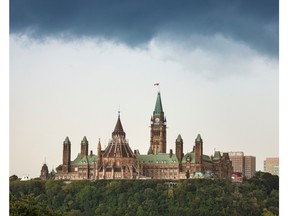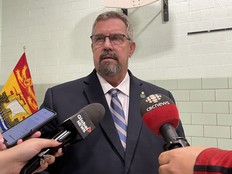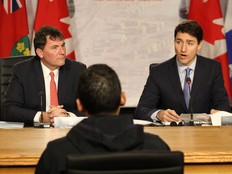NBers to receive larger carbon tax rebate cheques, others won’t
That’s as fewer New Brunswick homes are being heated by oil, now exempt from the federal government’s price on carbon

Article content
New Brunswickers will soon receive slightly larger carbon tax rebate cheques, while other Atlantic Canadians won’t.
That’s as fewer New Brunswick homes are being heated by oil, now exempt from the federal government’s price on carbon, than elsewhere in the region.
The federal government has unveiled how much individuals and families will be rebated in the fiscal year ahead. It was a question mark after the Trudeau government made a series of tweaks to the tax late last year.
In January, New Brunswick families of four got a $184 quarterly payment from the feds.
Individual New Brunswickers received $92.
It’s the money the feds collect from adding a carbon price to the cost of carbon emitting fuel.
But that figure will now rise to at least $190 quarterly for a family of four and $95 for individuals in New Brunswick beginning with a first cheque in April.
It now means $760 for a family of four over the next year, and $380 for individuals.
It’s a figure that increases to $912 for families and $456 for individuals who live in rural areas, which is much of the province.
Changes made
On April 1, the price on carbon goes up again from $65 a tonne to $80 a tonne in provinces where the federal backstop applies.
It will add 17 cents a litre to the price of gas, up from a current 14.31 cents per litre.
That means the federal government will collect more money in proceeds, and in turn remit higher cheques back to the individuals in provinces where it was collected.
But Prime Minister Justin Trudeau announced last year that the feds were eliminating the tax completely on home heating oil for the next three years.
That meant it would be collecting less revenue, particularly in provinces with a large percentage of homes that heat with oil.
That’s caused the overall rebate cheques to now be lower in the year ahead in Nova Scotia, Newfoundland and Labrador, and Prince Edward Island, despite the carbon tax going up on the fuels that remain subject to the charge.
“In Nova Scotia, Prince Edward Island, and Newfoundland and Labrador – where households more often rely on home heating oil – rebate amounts have been adjusted to reflect expected fuel charge proceeds in 2024-25 compared to 2023-24,” Environment and Climate Change said in a statement.
“In all other provinces where the federal fuel charge applies, Canada carbon rebate amounts have increased.”
A Nova Scotia family of four will receive $824 in four cheques over the course of the upcoming fiscal year, after receiving $992 last year. The figure in Newfoundland and Labrador drops from $1,312 to $1,192, and in Prince Edward Island from $960 to $880.
The overall cheques of New Brunswick’s neighbours remain higher as more tax is being collected in those jurisdictions.
Rural rebate
Meanwhile, a doubling of the rural rebate also kicks in.
Residents of small and rural communities were entitled to an additional 10 per cent supplement beyond the base amount which the feds says is in recognition of their increased energy needs and reduced access to cleaner transportation options, such as public transportation.
The cumulative rural payout for the last three quarters, which New Brunswickers have yet to receive, is also expected to drop at once as part of a next quarterly cheque in April, according to the federal government.
But Trudeau also pledged to double that to 20 per cent beginning in April.
“Rural” New Brunswick is classified by the federal government as everywhere in the province outside of the census metropolitan areas of Moncton and Saint John.
That includes everyone living in Fredericton.
The rebate program is using 2016 census data for the last time this year, which matters as Statistics Canada switched Fredericton to what’s called a Census Metropolitan Area after the 2021 census, as for the first time it reached a total population of at least 100,000 of which 50,000 are living in the city’s core.
It means every New Brunswicker, except those living in the metropolitan areas or Moncton and Saint John, gets the 20 per cent hike.
NB quarterly carbon tax rebate 2023-24
- $92 for an individual
- $46 for a spouse or common-law partner
- $23 per child under 19
- $184 for a family of four
NB quarterly carbon tax rebate 2024-25
- $95 for an individual ($114 rural)
- $47.50 for a spouse or common-law partner ($57 rural)
- $23.75 per child under 19 ($28.50 rural)
- $190 for a family of four ($228 rural)












Postmedia is committed to maintaining a lively but civil forum for discussion. Please keep comments relevant and respectful. Comments may take up to an hour to appear on the site. You will receive an email if there is a reply to your comment, an update to a thread you follow or if a user you follow comments. Visit our Community Guidelines for more information.